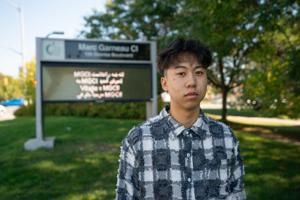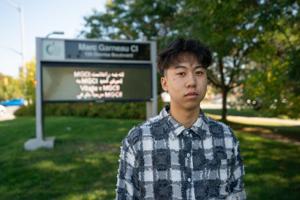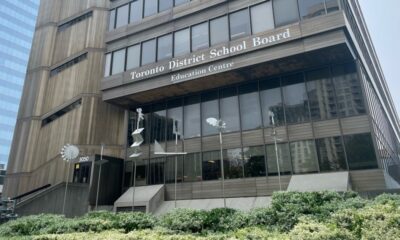Education
Toronto Students Split on Lottery Admissions for Specialty Schools

The Toronto District School Board (TDSB) has faced significant pushback regarding its 2022 decision to implement a lottery system for admissions into specialized programs. This shift, which replaced a merit-based selection process, has sparked debates among students, parents, and educators about its impact on school culture and academic performance.
At Marc Garneau Collegiate, attendance at student clubs has sharply declined, according to Grade 12 student Victor Jiang. He attributes this drop to the lottery admissions system, which he believes has diluted the quality of programs by enrolling students with varying levels of skill. Jiang, who is part of the TDSB’s specialized TOPS program, states, “It profoundly hurts the student community.” The TDSB has announced an update to its controversial admissions policy, with applications for the next academic year set to open in November 2023.
Critics argue that the lottery has not achieved its intended goals of increasing diversity and inclusivity. Some parents and educators claim that the system has led to higher dropout rates and a decline in program quality. They note that students are being pushed into programs they are not genuinely interested in or prepared for. In contrast, proponents of the lottery, such as parent Ayan Kailie, assert it provides equal opportunities for students from all backgrounds. Kailie’s daughter, a Grade 11 student at Etobicoke School of the Arts (ESA), is thriving in a program she may not have accessed under the previous merit-based system due to financial constraints on artistic supplies.
The lottery system was introduced to level the playing field for students, particularly those from lower-income families. Under the new policy, which prioritizes under-represented groups, students can apply without requiring auditions or portfolios. This approach has drawn mixed reactions, with some educators like Patricia Warnock, head of the music-theatre program at ESA, advocating for a return to merit-based admissions combined with fairness measures. Warnock notes that even before the lottery, ESA had made efforts to enhance access through redesigned audition processes and outreach initiatives.
However, she raises concerns about the consequences of the lottery on student engagement and retention. Reports indicate that dropout rates have surged since the system’s implementation, with nine Grade 9 students transferring out last year, up from just one in 2019-20. Warnock observes a decline in student enthusiasm, noting that some students are enrolled in programs without a genuine interest or background in the subject matter.
At Rosedale Heights School of the Arts, Grade 12 student Hailey Jackson echoes these sentiments, highlighting a decrease in school spirit. Previously vibrant events, like Halloween Week, have seen reduced participation, particularly among younger students. Jackson worries that the current lottery system may exclude talented students who could excel in specialized programs.
Supporters of the lottery argue that it offers a fair chance to all students, regardless of their socioeconomic backgrounds. Yet, critics like Michael Danishevsky, co-chair of the parent council at William Lyon Mackenzie Collegiate Institute, contend that it has led to lowered academic standards and increased dropout rates. Danishevsky’s son is in the school’s enriched math, science, and computer technology program, which he believes has suffered from the lottery’s implementation.
In a report co-authored with Marcin Peski from the University of Toronto, Danishevsky found that TDSB performance in national math contests has declined since the lottery was introduced. The findings suggest that the lottery admissions policy has materially weakened student performance, as evidenced by the absence of TDSB schools in the top rankings of the Grade 10 contest.
As the TDSB prepares to revisit its admissions policy, the ongoing debate highlights the complexities of balancing equity and academic rigor. The outcomes of this discussion will not only shape the future of specialized programs but also impact the educational experiences of students across Toronto. With applications opening soon, the board’s decisions will be closely scrutinized by a community eager for clarity and direction.
-

 World3 months ago
World3 months agoScientists Unearth Ancient Antarctic Ice to Unlock Climate Secrets
-

 Entertainment3 months ago
Entertainment3 months agoTrump and McCormick to Announce $70 Billion Energy Investments
-

 Science3 months ago
Science3 months agoFour Astronauts Return to Earth After International Space Station Mission
-

 Lifestyle3 months ago
Lifestyle3 months agoTransLink Launches Food Truck Program to Boost Revenue in Vancouver
-

 Technology2 months ago
Technology2 months agoApple Notes Enhances Functionality with Markdown Support in macOS 26
-

 Top Stories1 week ago
Top Stories1 week agoUrgent Update: Fatal Crash on Highway 99 Claims Life of Pitt Meadows Man
-

 Sports3 months ago
Sports3 months agoSearch Underway for Missing Hunter Amid Hokkaido Bear Emergency
-

 Politics2 months ago
Politics2 months agoUkrainian Tennis Star Elina Svitolina Faces Death Threats Online
-

 Technology3 months ago
Technology3 months agoFrosthaven Launches Early Access on July 31, 2025
-

 Politics3 months ago
Politics3 months agoCarney Engages First Nations Leaders at Development Law Summit
-

 Entertainment3 months ago
Entertainment3 months agoCalgary Theatre Troupe Revives Magic at Winnipeg Fringe Festival
-

 Politics1 week ago
Politics1 week agoShutdown Reflects Democratic Struggles Amid Economic Concerns















